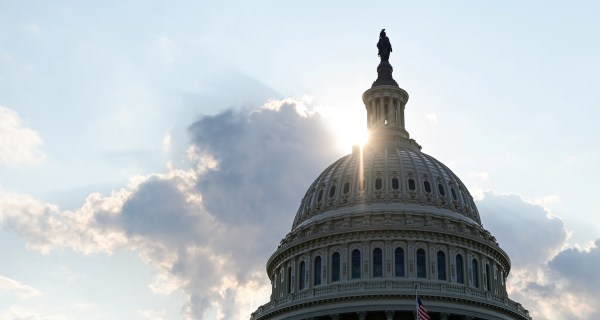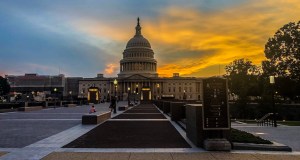2016 in review: Capitol Hill’s big year in tech legislation

It’s been a busy year for legislation with a technology bent, including bills on IT modernization, and research and development.
While some bills didn’t make the cut, here are a few FedScoop has been tracking that were signed into law during 2016 or were headed to the president at the end of the year.
H.R. 5877 – the U.S.-Israel Advanced Research Partnership Act of 2016
Signed into law Dec. 16, the bill was one of two introduced in July after Reps. John Ratcliffe, R-Texas, and Jim Langevin, D-R.I., visited Israel on a congressional delegation focused on key cybersecurity issues facing both countries, such as protecting power grids from hackers.
The law will “enhance cybersecurity for the United States and Israel, putting us on a shared path toward innovative solutions to the threats we face,” said Langevin, co-founder and co-chairman of the Congressional Cybersecurity Caucus.
The U.S.-Israel Advanced Research Partnership Act will expand a successful binational research and development program at the Homeland Security Advanced Research Projects Agency to include cybersecurity technologies. This collaboration between DHS and the Israeli Ministry of Public Security helps new products through the “valley of death” from basic and early-phase applied research to successful commercialization.
[Read more: One of two U.S.-Israel cybersecurity cooperation bills signed]
Using bots or other technology to manipulate ticket-selling websites is now illegal under a bill signed into law Dec. 15.
The measure is designed to curb price inflation on the secondary market for tickets to see concerts, theater, sports and other events. Scalpers have been known to use bots to swamp ticket-selling sites as a way of dodging limits on purchases or other rules set by sellers.
The Federal Trade Commission and individual states will have the power to investigate and penalize offenders.
The White House says the new law “prohibits the circumvention of control measures used by Internet ticket sellers to ensure equitable consumer access to tickets for certain events.” It was signed by the president Dec. 15.
“These bots have gotten completely out of control and their dominance in the market is denying countless fans access to shows, concerts, and sporting events and driving prices through the roof,” Sen. Charles Schumer, D-N.Y., one of the bill’s original cosponsors, said in a statement. “With this soon to be new law that will eliminate ‘bots’ and slap hackers with a hefty fine, we can now ensure those who want to attend shows in the future will not have to pay outrageous, unfair prices.”
The bill would also make it illegal to knowingly resell tickets acquired through the use of bots or similar means.
Lin-Manuel Miranda, creator of the award-winning musical “Hamilton,” was a huge supporter of the bill.
[Read more: New tech bills make for busy week on the Hill]
H.R. 4904 – MEGABYTE Act of 2016
Signed into law on July 29, Rep. Matt Cartwright’s MEGABYTE Act aims to curtail unnecessary software spending in government.
The law “tasks the Office of Management and Budget and chief information officers to keep inventories of software licenses, train their IT management workforce on how to manage software licenses, and use the software license information to manage the agency’s software licenses in accordance with agency policy,” according to a news release from Cartwright, a Democrat from Pennsylvania.
“Cost savings and cost avoidance on software would be released in public reports,” the release also notes.
Cartwright said the goal was to improve efficiency in the federal government, “and sometimes it’s surprising the places you find an opportunity.” There is “considerable waste in software license expenditures,” he said.
The federal government spends about $80 billion a year on IT, and several recent efforts, like the Federal IT Acquisition Reform Act, have endeavored to curb waste. OMB announced in June it would require agencies to remove redundant licenses and appoint a software manager within 45 days.
The MEGABYTE Act would dovetail some of the reforms in FITARA, Rep. Will Hurd, R-Texas said on the House Floor in June.
“It’s simple, it’s straightforward, and it makes sense,” Hurd said of Cartwright’s bill.
[Read more: House passes ‘Megabyte Act’ to increase oversight of software licensing]
S. 3084 – American Innovation and Competitiveness Act
A bipartisan bill designed to streamline research and development of technology and expand participation in science cleared Congress on Dec. 16. President Obama had not yet signed it as of publication.
The bill generally is geared toward programs at the National Science Foundation and National Institute of Science and Technology. The measure “maximizes basic research opportunities, reduces administrative burdens for researchers, encourages scientific entrepreneurship, and promotes oversight of taxpayer-funded research,” according to a news release from sponsor Sen. Cory Gardner, R-Colo.
A sizable portion of the legislation orders agencies to make grants or create working groups geared toward increasing the participation of women and other underrepresented populations in STEM fields. It also urges federal agencies to consider crowdsourcing and collaborative science with ordinary citizens.
Gardner said that in clearing the bill, Congress had “made science bipartisan again.”
“We’ve worked for more than 18 months with the scientific community, industry, universities, and other interested stakeholders to craft a bill that reflects the needs of America’s science and technology enterprise and I will continue to work to ensure their needs are addressed in Congress,” Gardner said.
The legislation is important because it will improve “the process by which federally funded knowledge creation leads to actual innovation and U.S. jobs,” said Robert D. Atkinson, president of the Information Technology and Innovation Foundation, in a written statement.
The bill orders the White House’s National Science and Technology Council to coordinate federal research on high-energy physics, and it also asks NIST to research future cybersecurity needs such as cryptography resistant to quantum computing.
The bill does not include specific funding authorizations for NSF and NIST. A version approved by the Senate Commerce, Science and Transportation Committee in June proposed a 4 percent increase in the agencies’ authorizations for fiscal 2017 and fiscal 2018 for the two agencies.
[Read more: Senate Commerce Committee approves technology research policy bill; Bill on research policy seeks to engage women, minorities]
S. 337 – FOIA Improvement Act of 2016
Signed into law in June, the law “places the burden on agencies to justify withholding information, instead of on the requester to justify release,” according to a press release from the House Committee on Oversight and Government Reform.
The bill, which is the biggest addition to the Freedom Of Information Act since since the open-government law was signed by President Lyndon Johnson 50 years ago, will codify policy memorandums Obama put out on his first day of office.
Additionally, the bill will create a centralized FOIA request website, which will allow people to find the right office to request information from, track requests online and figure out if the information they want has already been publicly released. The White House will also examine a standard of “release to one is to release to all,” which would direct agencies to proactively post their FOIA responses online.
“The Freedom of Information Act is one of the key ways in which citizens are able to find out what exactly is going on in government,” Obama said just prior to signing.
[Read more: Obama signs FOIA Improvement Act into law; FOIA bill heads to Obama’s desk]
Contact Samantha via email at samantha.ehlinger@fedscoop.com, or follow her on Twitter at @samehlinger. Subscribe to the Daily Scoop for stories like this in your inbox every morning by signing up here: fdscp.com/sign-me-on.





